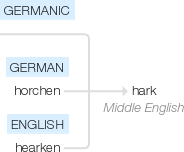Hark
Middle English: of Germanic origin; related to German horchen, also to hearken.
wiktionary
From Middle English herken, herkien, from Old English *hercian, *heorcian, *hiercian, ultimately from Proto-Germanic *hauzijaną(“to hear”) + formative/intensive -k (see also the related hīeran, whence English hear). Equivalent to hear + -k. Cognate with Scots herk(“to hark”), North Frisian harke(“to hark”), West Frisian harkje(“to listen”), obsolete Dutch horken(“to hark, listen to”), Middle Low German horken(“to hark”), German horchen(“to hark, harken to”).
etymonline
hark (v.)
c. 1200, from Old English *heorcian "to hearken, listen," perhaps an intensive form from base of hieran (see hear). Compare talk/tale. Cognate with Old Frisian harkia "listen," Middle Dutch horken, Old High German horechon, German horchen. Used as a hunting cry to call attention. To hark back (1817) originally referred to hounds returning along a track when the scent has been lost, till they find it again (1814). Related: Harked; harking.
